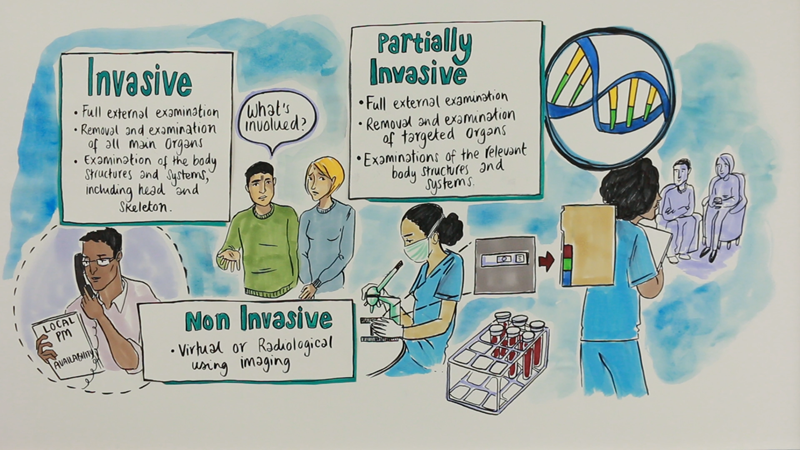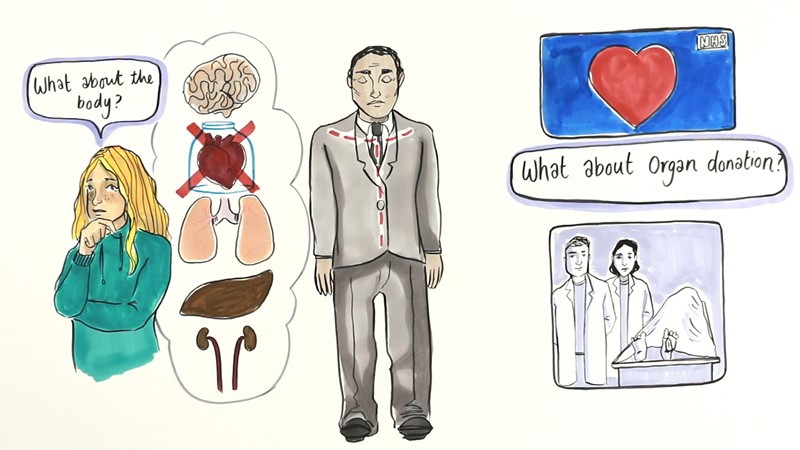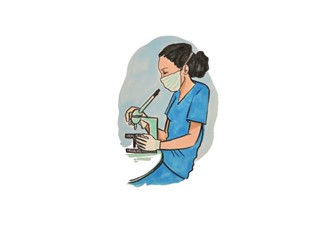There are two main types of post mortem examination – Procurator Fiscal instructed and Authorised (Hospital) post mortem examinations.
If you are involved in discussing post mortem examinations with those who are bereaved it is helpful if you are fully informed about the procedure and processes which will occur. Support from your local pathology or mortuary team can be valuable.
Authorised (Hospital) Post Mortem Examination
This video introduces how conversations about adult authorised (hospital) post mortem examinations can be approached with those who have been recently bereaved.
Please note that all the videos on this website deal with issues of death and bereavement and were created for healthcare professionals: caution is advised for viewers who are not healthcare professionals as some may find the themes upsetting.
A transcript of this video can be found here, and a downloadable leaflet which accompanies the video can be found here.
 Clinical teams are sometimes reluctant to discuss post mortem examination, despite it potentially being an important investigation.
Clinical teams are sometimes reluctant to discuss post mortem examination, despite it potentially being an important investigation.
It can provide valuable information to those who are bereaved and to the medical profession.
Good communication with those who are grieving is critical to assist and not hinder the bereavement process.
It is both important to ensure that the potential benefits of a post mortem examination have been explained and understood, in addition to the potential implications of declining one.
Types of post mortem

The benefits of a post mortem examination can include:
-
Helping those who are bereaved to understand exactly what may have caused an individual’s death
-
Gathering information which can benefit relatives e.g. detection of genetic conditions and identification of opportunities for targeted screening
-
Providing additional information around the circumstances of the death, e.g. efficacy of treatment in a natural death
-
Helping with the grieving process for those who are bereaved
-
Contribution to medical research

FAQs about authorised (hospital) post mortem examination:
-
Are there any particular groups to whom I should not offer post mortem?
No. Some people may refuse a post mortem examination based upon their (or the deceased person’s) spiritual, cultural or faith beliefs but one should not make assumptions about a person’s views.
The opportunity to identify useful information for living relatives should be offered in every situation in which it is medically appropriate.
-
Can someone have a post mortem examination if they are going to be an organ donor?
Yes. A post mortem examination in this situation would be completed after the organ(s) have been removed.
Even if there has been a full organ harvest, a post mortem examination can still be performed in order to examine the remaining structures.
-
Can someone have a post mortem examination if they also wish to bequeath their body to medical science?
No. This is not possible.
-
Can an authorised (hospital) post mortem examination be performed for someone who did not die in hospital?
Yes. These can be requested for someone who died in a hospital or a community setting.

How does an authorised (hospital) post mortem examination differ from a Procurator Fiscal instructed post mortem examination?
-
Whilst the views of those who have been bereaved will be considered before a Procurator Fiscal instructed post mortem examination, authorisation from the deceased, their nearest relative or other nominated individual is only required for an authorised (hospital) post mortem examination
-
The procedures are usually similar e.g. locations of incisions and appearance of the body once the post mortem examination is complete
-
Investigations such as toxicology are more commonly undertaken as part of a Procurator Fiscal post mortem examination
-
The length of time that it takes for the results to become available and the body released is often considerably longer for a Procurator Fiscal post mortem examination
-
Authorised (hospital) post mortem examinations are usually performed by one pathologist, whereas Procurator Fiscal post mortem examinations may be performed by two pathologists, often with the Procurator Fiscal and Police in attendance
-
Relatives will not usually be able to touch the deceased’s body before a Procurator Fiscal instructed post mortem examination, whereas this is usually possible before an authorised (hospital) post mortem
For more information about:
The role of the Procurator Fiscal click here
Reporting deaths to the Procurator Fiscal click here
The management of sudden and unexplained deaths click here
The Management of Deaths in the Community (in hours and out of hours), Scottish Government Chief Medical Officer guidance click here
The Human Tissue Act (Scotland) 2006 click here
Links for the public:
Sources of more information for those who are bereaved, including details about tissue samples, blocks and slides, genetic testing and organ retention are available on the Scottish Pathology Network.
Post mortem examination following stillbirth or neonatal death
For information on post mortem examination following a stillbirth or neonatal death click here